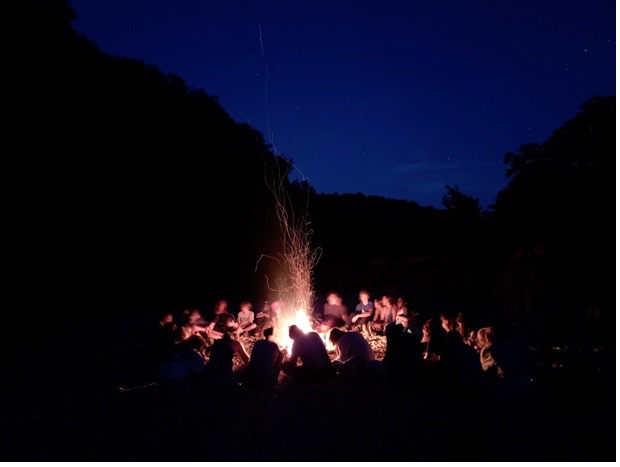Feature photo by Alison Tsacoumangos.
“Do any human beings ever realize life while they live it? — every, every minute?”
For the past few years, I’ve been teaching a Senior Honors Seminar that uses Emily Webb’s question from Thornton Wilder’s Our Town as both provocation and guide. I am currently teaching this once-per-week single semester course for the fifth time: it has never felt more relevant.
There is something truly powerful about spending 42 minutes a week discussing carpe diem literature with seven or eight bright high school seniors. As they navigate this final, super intense year of their six-year John Burroughs School journey, they are constantly looking both backward and forward. Especially as we march toward commencement and their June progression into graduation grove, every day offers poignant lessons in liminality. What better time to practice noticing the present?
I meet my delightful crew during 5th period on Mondays: we talk, laugh, and spur each other on in our quest to stay fully present. Texts shift and change, depending on my whims and our collective interests, but certain works are staples: “On Slowing Down,” an essay delivered as a commencement address at Choate Rosemary Hall by Billy Collins back in 2003; poems by William Wordsworth, Mary Oliver, Ted Kooser, Walt Whitman, and Seamus Heaney; “The Walker and the Saint,” an essay by Edie Littlefield Sundby who walked the entire California Mission trail while dying of cancer; “A Temporary Matter” by Jhumpa Lahiri; and I am, I am, I am: Seventeen Brushes with Death by Maggie O’Farrell. Twice I’ve taught Wilder’s Our Town. Students write three “Now Notes or Impressions” as a midterm challenge, teach “holy now” poems in pairs, and complete a final creative project that centers on the phrase “You Must Be Present to Win.”
Because JBS students apply to enroll in our senior honors seminars, they complete everything I assign with devotion; the fact that the course is offered pass/fail is a kind of respectful tribute to their collective diligence, granting all of us the freedom to learn and grow outside the machinery of points and delimiting letters.

Highlighting Spots of Time
Almost by accident the first time I taught the seminar, I developed the habit of beginning each of our weekly sessions with a roundtable sharing of our individual “spots of time”: the moments that shimmered for us during the past week. This spring, Estelle talked about walking her labradoodle at the golf course, Cece described dancing around her kitchen, and Joe mentioned watching a freshman dunk at the buzzer during the Principia basketball game. Part lab report, part “Show and Tell,” these weekly exchanges create bonds and spark lively conversation while reminding all of us to pay keen attention to the ephemeral here and now.
One quotation I offer my students in their opening packet is delivered by theologian Mark Buchanan when he was asked about his most profound regret: “Being in a hurry. Getting to the next thing without full entering the thing in front of me. I cannot think of a single advantage I’ve ever gained from being in a hurry. But a thousand broken and missed things, tens of thousands, lie in the wake of all the rushing.”
Naomi Shihab Nye captures a similar sentiment here: “I have always loved the gaps, the spaces between things, as much as the things. I love staring, pondering, mulling, puttering. I love the times when someone or something is late — there’s that rich possibility of noticing more, in the meantime . . . There is so much we overlook, while the abundance around us continues to shimmer, on its own.”
When we start trying to “number our days” (as in Psalm 90:12), we find helpful instructions everywhere: “Listen to your life,” instructs Frederick Buechner in his memoir Now and Then, “See it for the fathomless mystery it is. In the boredom and pain of it no less than in the excitement and gladness: touch, taste, smell your way to the holy and hidden heart of it because in the last analysis all moments are key moments, and life itself is grace.”

Looking to Nature
“What helps us stay present in the moment?” my students and I ask each other, directly and indirectly, each week. Within our full to overflowing schedules, how do we make the time to stand and look, to notice and celebrate? Certain themes emerge as we puzzle out this conundrum — taking walks, staying off phones, breathing on purpose, looking up at the sky, playing with kids or dogs — a sort of recipe-list for entering John Keats’ “negative capability.” Of course, all of this is easier said than done, especially in school settings such as ours. But in my students’ written responses I get encouraging glimpses of their progress:
“Every time I visit the Bluffs for a sunset watch, either alone or with trusted friends, I enter the sanctuary of a vacant or contemplative headspace, both rooted in awe and wonder. The world spins around me, the blood orange sun droops farther into the stretching horizon, the hills roll along into the same focal point — and I, I am still.” (Esther)
“When I find myself becoming anxious, one of my most useful coping mechanisms is to go outside and connect with nature — literally to ground myself. Whether that’s breathing to the rhythm of a swaying tree or considering the life of a bug to put mine into perspective, nature always has something to teach me; it’s on me to take notice.” (Liv)
“I remember looking at the mountains and thinking about how they’re always there and have always been there. I kept obsessively worrying about my upcoming audition but then I remembered that whatever happens in my life won’t change the fact that this beautiful place will remain. In this way the mountains reminded me of the permanence of nature and the impermanence of anxiety.” (Madeline)

Recasting Amazing
In Our Town when Emily begs the Stage Manager to let her re-live a single day of her truncated life, he tells her: “Choose the least important day in your life, it will be important enough.” It has taken me decades to understand the wisdom of this remark. In my mid 50s, I now understand this directive best when I long for an hour, any hour, with the toddler versions of my fully grown sons, or 30 minutes, any 30 minutes in the corporal company of my now heavenly Mom. As critic Sam Anderson said, “We don’t need great writing [or honors seminars] to tell us that the obviously amazing things are amazing, just as we don’t need high-powered telescopes to tell us that the sun is warm. What we need from great writing [and thoughtful seminars] is an understanding that the mundane itself — snails, fireplaces, shrubs, pebbles, socks, minor witticisms — is secretly amazing.”

Between 2016 and 2019, we lost a string of young alums to early death. Then COVID happened and the whole world turned sideways. This year, for the first time in two decades, I taught Much Ado About Nothing instead of Hamlet in my regular senior courses. Even though I encouraged my students to read the great tragedy on their own, after more than 25 years spent plumbing the depths of grief with young Hamlet, I simply could not spend another five weeks in that graveyard.
Yet part of why I teach this seminar is not only to remind my busy students and myself to keep paying a kind of fervent attention to our lives, but also to remind us that our time here is truly fleeting. To paraphrase Walt Whitman from “Crossing Brooklyn Ferry,” in just a few short years, others will sit in their seats in morning assembly, and others will move from room to cheerful room; ten years hence, others will launch the three-point shot at the buzzer, and others will captain the teams; twenty years hence, others will laugh at their assigned lunch tables and others will stargaze on the gravel bar down at Drey Land . . . once they really get a down-in-the-gut sense of those realities, they find it harder to sleepwalk through any of their precious days.





